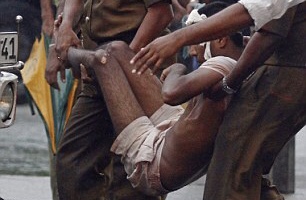The Supreme Court has ordered six police personnel serving in the Kandaketiya Police Station in 2014 to pay compensation in the sum of Rs.300,000 to a mother of a 17-year-old deceased son who died after being assaulted by police personnel in 2014.
The Supreme Court further ordered the six respondents to pay a sum of Rs. 60,000 to the petitioner in lieu of litigation costs.
In his judgment, Justice S. Thurairaja observed that the petitioner, the mother of the deceased, is a poor village woman who was expecting to rest her life with her son, whose unfortunate demise caused her shock, loss of care and support.
Meanwhile, Supreme Court further ordered the six respondent police personnel to pay a compensation of Rs.240,000 to the four relatives of the deceased who accompanied him and who were further subject to assault by the errant police officers.
Supreme Court three-judge-bench comprising Justice Sisira de Abrew, Justice MurduFernando and Justice S. Thurairaja held that first respondent D.M. Aberathna, second respondent D.P.K Gamage and third respondent S.M.R.P. Kumara, the Police Constables in the Kandaketiya Police station and the fourth respondent S.J.M. Jayasundara a Civil DefenceForce officer, fifth respondent D.M. Wijeratnawho belongs to the Reserve Staff attached to the Kandaketiya Police station and the sixth respondent R. P. Somarathne a Sub Inspector have violated the Fundamental Rights of the deceased, which is guaranteed under Article 11,12 (1), 13(1) of the Constitution.
In her petition, Kanda Udage Mallika of Meegahakivula said her son Sandun Malinga’sdeath was the result of being assaulted by four police personnel at the Kandeketiya Police Station on the 7th of May 2014.
The mother stated that from the time her son left school he helped the family by obtaining agricultural produce to sell at the various markets in Badulla. She stated that on May 7, 2014, her two sons had finished their evening meal and accompanied her brother and a few other relatives to purchase a three-wheeler at Ketawatta.
The mother stated she received a telephone call informing her that Kandaketiya police personnel were seen taking her children and the relatives to the police station after assaulting them.
She stated that at the police station she saw her relatives and her two sons who appeared to have been assaulted by the police. Malinga had complained to his mother that Sub Inspector Somaratne and other officers had assaulted him and that he was suffering from severe chest pain and pleaded with his mother to rub his chest.
She said she realized that her son was in a critical condition and pleaded with SI Somaratne to take them to the hospital but he had shouted at her and that neither did the Meegahakivula Hospital DMO take any note of the serious health condition of her children and that of her relatives.
The mother stated that there was willful negligence by the DMO and that the police had told the Magistrate the suspects were arrested on suspicion for treasure hunting. Subsequently, the Magistrate had given a remand order and they were remanded for 14 days.
She stated that the Magistrate didn’t inquire whether the suspects were assaulted and neither were they allowed informing the Magistrate about the police torture.
The mother stated that according to her elder son they were only admitted to the hospital after the death of her younger son.
The respondents in their statement of objections had stated that at their time of arrival to the scene, there was a commotion taking place between the parties and further said they only used minimum force to separate them and had questioned them later.
However, as per the Post-Mortem Report (PMR) of the deceased, the deceased had several injuries including blunt forced head and chest injuries involving the brain, heart and Lungs. The Supreme Court held that as per this evidence it is clear that the injuries were not due to a ‘commotion’ or a result of the use of ‘minimal force’ but due to heavy attacks possibly as described by the mother of the deceased.
It was revealed that the six respondents have been found guilty of the offences including the murder of the deceased, being members of an unlawful assembly and they were sentenced to death by Badulla High Court in a judgement dated 9th January 2017.
Meanwhile, the Supreme Court held that the state has fulfilled its obligation, therefore, the state is not responsible for the violation.





